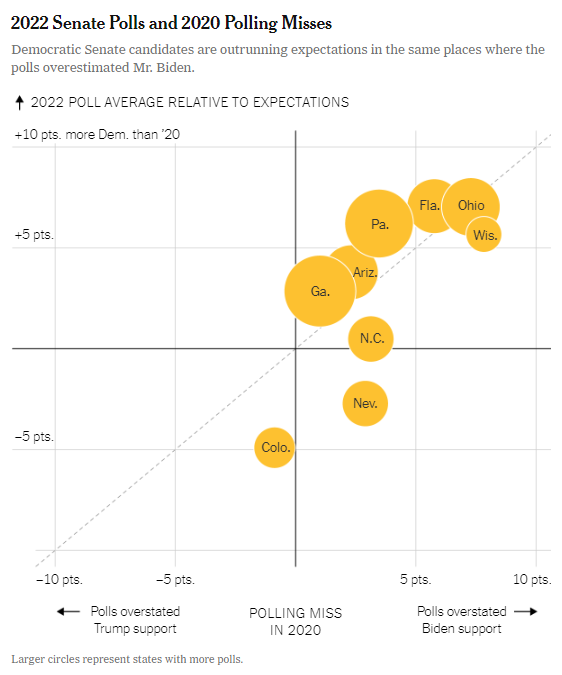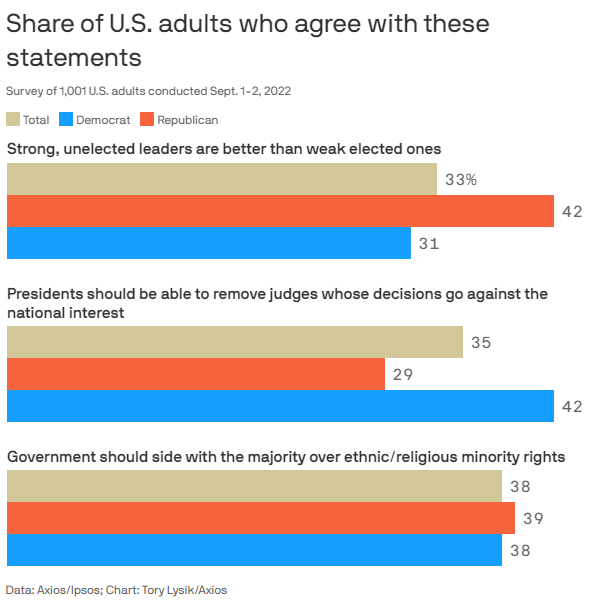It’s primary day in New Hampshire! (And also Delaware and Rhode Island, but they don’t have fun Senate contests to discuss so we’re going to ignore them completely.)
First, let’s revisit the math: If Republicans hold onto all of their current seats (Ohio, Pennsylvania, Wisconsin), they still need to pick up one seat currently held by Democrats. Earlier this year, Republicans had a lot of their eggs in the Georgia and Arizona baskets but these days they are looking to diversify their portfolio. That’s where Nevada, Colorado, and New Hampshire come into play. If Arizona pulls away from Blake Masters or a flailing Mehmet Oz candidacy in Pennsylvania requires the GOP to grab two seats, these states are next on the list. But how realistic are Republican chances in any of them?
The answer to that question, at least in New Hampshire, depends almost entirely on the outcome tonight.
The Republican Senate primary has come down to Chuck Morse—the state Senate president who is backed by state and national Republicans—and Don Bolduc—the Trump-style election denier who was leading the polls by double digits heading into the final stretch of the race. Obviously, Republicans think Morse is their only real shot to beat Democratic incumbent Maggie Hassan in November—or at least to make national Democrats spend a lot of money to defend the seat, which could leave a seat like Georgia or Arizona more vulnerable.
Democrats agree. Senate Majority Leader Chuck Schumer’s group, Senate Majority PAC, has spent $3.2 million on ads to help Bolduc, referring to Morse as “another sleazy politician.” This has played out repeatedly this cycle. According to the Washington Post, Democrats have spent “$19 million across eight states in primaries this year amplifying far-right Republican candidates who have questioned or denied the validity of the 2020 election, interfering in GOP contests to elevate rivals they see as easier to defeat in November, even as those candidates have promoted false or baseless claims.” By their count, national Democrats have spent money supporting the more extreme GOP candidate in at least 13 Republican primaries—six gubernatorial races, two Senate contests, and five House campaigns. With two more decided tonight in New Hampshire.
Trump, interestingly, hasn’t endorsed anyone in the New Hampshire Senate race. But in radio interviews, Trump certainly had nice things to say about Bolduc: “He said some great things, strong guy, tough guy.”
So what’s the bottom line for tonight? Bolduc seemed to have the wind at his back a few weeks ago, but since then Republicans have hit the airwaves for Morse to try to win over the undecided voters in the race. David Carney, a strategist for Morse, told the New York Times, “Gen. Don Bolduc isn’t on TV, he has no radio, there’s no message, no way to reach new people — and we do.” Except, of course, for all those ads being run by the Democrats.
Hassan, for her part, is practicing her Heisman moves on her party’s White House. “I’ll continue to stand up to the Biden administration on the issue of securing the border,” she recently said, while adding, “I don’t support canceling all student debt.”
New Hampshire is a bright purple state with a popular Republican governor, two Democratic senators, a Republican house and Senate, and a highly engaged electorate. Maybe it’s their 400-plus person state house body or maybe it’s their role as FITN (first in the nation) for presidential primaries. Either way, unseating Hassan—like any incumbent—will be an uphill climb. Polling shows her with a small but consistent lead over both candidates.
But what about Colorado? These days, Colorado is probably best characterized as a blue state that used to be a purple state. Democratic incumbent Sen. Michael Bennet wasn’t considered a particularly vulnerable member, but construction company CEO Joe O’Dea may be nipping at his heels. National Democrats spent big—$4 million—in the Republican primary to boost a Trumpier candidate, but O’Dea won anyway and now at least some polls show him neck and neck with Bennet. Like New Hampshire, my money is on the incumbent, but all it takes is some momentum and a little luck at the end for the party out of power to win in a midterm.
And then there’s Nevada. It may feel like a more blue-hued state, but it voted for George W. Bush in 2000 and 2004. As the state’s Latino population has increased, both parties see an opportunity. Adam Laxalt, the Republican nominee, is a former statewide office holder with a famous last name. (He is the grandson of former Republican Nevada Gov. and U.S. Sen. Paul Laxalt. Paul’s daughter raised Adam by herself, but 10 years ago, the family acknowledged that Adam was the son of Paul’s Senate colleague from neighboring New Mexico, Pete Domenici. Woof.) Democratic incumbent Sen. Catherine Cortez Masto won Harry Reid’s old seat in 2016, so this is her first time up for reelection and she is considered by some to be the most vulnerable incumbent out there. The outcome could determine control of the Senate, but it also will be a test for whether Republicans can make serious inroads with Latino voters outside of Texas and Florida.
What’s In a Vibe Shift
Democrats finally feel like momentum is on their side. Democrats overperformed in all four special elections that have happened since the Supreme Court overturned Roe v. Wade. The polls have also shifted. Congressional Democrats now narrowly lead Republicans in the “generic ballot” question, according to FiveThirtyEight’s and RealClearPolitics’ polling averages. Races that were once in the R column have moved back to the D column. Democratic incumbents that were left for dead are now favored to win. The Senate suddenly feels safe and talk of keeping the House feels like more than a punchline.
But what if the polls are wrong? Since 2014, the polling averages have skewed in favor of Democrats to varying degrees. Even after the catastrophic failures in 2016, the problem doesn’t seem to be getting better. In 2020, FiveThirtyEight’s polling average had Biden leading Trump in Wisconsin by nearly 7 points (Biden won by less than 1 point), GOP Sen. Susan Collins losing to Democratic challenger Sara Gideon by 2 points (Collins won by 9), and GOP Sen. Lindsey Graham in a dead heat against his Democratic opponent Jamie Harrison (Graham won by 10 points.)
Nate Cohn, chief political analyst at the New York Times, has noticed dark clouds gathering on the horizon. “Democratic Senate candidates are outrunning expectations in the same places where the polls overestimated Mr. Biden in 2020 and Mrs. Clinton in 2016,” he wrote this week.
And he’s provided us with a handy chart showing which state’s polls were most likely to be off in those elections. Note how far right Wisconsin is and then take another look at the poll showing Johnson’s Democratic challenger up by 7 points. Or Crist closing the gap in Florida against Ron DeSantis and Rubio suddenly in trouble too. On the other hand, Georgia’s polls should be pretty accurate if 2016 and 2020 are any guide…so that’s not much help for Republican Senate nominee Herschel Walker, who has an extremely thin lead over incumbent Raphael Warnock in the latest polls.

From Cohn again: “It raises the possibility that the apparent Democratic strength in Wisconsin and elsewhere is a mirage — an artifact of persistent and unaddressed biases in survey research.” When factoring the average polling error from 2016 and 2020 into the current Senate polls, Cohn found that Republicans would easily win Ohio (despite polls showing it as a tied race) and are within striking distance in Georgia and Nevada.
Patrick Ruffini, looking at 2014 and 2018 also, found Democrats were overestimated in twice as many races as Republicans and that “across all 112 elections, Democrats were overestimated an average of 2.7 points.”
“If the polls are wrong yet again, it will not be hard to explain,” wrote Cohn. “Most pollsters haven’t made significant methodological changes since the last election. The major polling community post-mortem declared that it was ‘impossible’ to definitively ascertain what went wrong in the 2020 election.”
But perhaps we’re just looking at the wrong polls.
“A lot of the perceptions around the inaccuracy of polling is unfortunately, due to the fact that there are always going to be polls out there that aren’t really methodologically representative and sound that are getting a lot of reporting,” said Gallup editor in chief Mohamed Younis.
The key to any poll is, one, developing a likely voter model, and two, collecting response rates that can gather a representative sample across the population, according to Younis.
Easier said than done. The size of the pool matters. It’s why national polls are generally more accurate than state polls. And why smaller states like Wisconsin have been notoriously difficult to predict accurately. But that’s not all. The biggest problem remains that very few people answer polls anymore, and the people who don’t respond to polls differ politically from the people who do.
Until pollsters can reliably solve that problem, the skew remains.
2024 Talk
Sen. Ted Cruz was in New Hampshire last week and had this to say to David Drucker at the Washington Examiner about why he’s waiting to see what Trump does before deciding his own plans for 2024.
There are a lot of candidates out there feeling their oats and boasting, ‘I’m running no matter what. I don’t care what Donald Trump says.’ Anyone who says that is lying. That’s an idiotic statement for someone to make who’s actually thinking about running … I don’t know what Trump’s going to decide — nobody does. Anybody who tells you they do is making things up. The whole world will change depending on what Donald Trump decides. That’s true for every candidate. That’s true of every potential candidate.
He’s not wrong.
Well, That’s Depressing
So much for our shared democratic norms, according to the Axios-Ipsos Two Americas Index.

Andrew has a story on the site today on the latest with Republican Senate candidate Herschel Walker in Georgia:
Here Comes Herschel
NORCROSS, Ga.— Walker, who recently retooled his campaign, is coming off a summer to forget. The candidate had endured news cycles about previously unreported illegitimate children, false claims of having worked in law enforcement, as well as inflated stories about his entrepreneurial endeavors. Then there is his documented history of mental illness, including past tendencies of violence. His former wife has accused him of threatening to kill her, and Walker himself has recounted the story of how he once drove to a nearby city, armed with a gun, with the intent of killing a delivery driver he thought had disrespected him.
Walker’s critics have argued that he’s a celebrity who’s woefully unprepared for the actual work of politics, circulating clips of some of the more far-out comments he’s made on the campaign trail: head-scratching riffs on climate policy (“Since we don’t control the air, our good air decided to float over to China’s bad air, so when China gets our good air, their bad air got to move”), the theory of evolution (“If that is true, why are there still apes? Think about it”), and the appropriate policy response to school shootings (“a department that can look at young men that’s looking at women that’s looking at social media”).
The accumulated weight of controversy took a toll on the Walker campaign, and his numbers sagged throughout the summer, occasionally polling as much as 9 or 10 points below Warnock. At the lowest point, his campaign seemingly tried not to sink any farther, barring media from public events for a time. The strategy seemed only to highlight the gaffes that leaked anyway.
By mid-July, the campaign changed course. Walker brought on a set of experienced GOP operatives to stop the bleeding, and it worked. In a matter of weeks, he found the discipline to keep the conversation on his strongest issues: the economy, “woke” politics, and attacks on Warnock’s voting record.
Walker has even worked a few disarmingly self-deprecating lines about his past controversies into his regular stump speech: “They’ve spent almost $50 million against me already, can you believe it?” he said Friday. “I told ’em, give me the money—I’ll make myself look bad.”
Meanwhile, he’s come back strong in the polls, even as the national environment has continued to sour for Republican candidates: Three polls in a row have now shown Walker with a small lead over Warnock.
Some of this surge was likely inevitable, with ostensible ticket-splitters who support Gov. Brian Kemp coming back to the Republican column. “It’s numbers drifting back to reality,” conservative activist Cole Muzio told The Dispatch. “Kemp is doing a great job elevating the whole ticket.”
Still, Walker’s apparent ability to tighten things up has helped. “You’d think the environment stabilizing for Democrats would have helped Warnock—particularly in a state so close that every little movement matters,” GOP consultant Brian Robinson said. “But things have largely stayed the same. Herschel is very much in it.”








Please note that we at The Dispatch hold ourselves, our work, and our commenters to a higher standard than other places on the internet. We welcome comments that foster genuine debate or discussion—including comments critical of us or our work—but responses that include ad hominem attacks on fellow Dispatch members or are intended to stoke fear and anger may be moderated.
With your membership, you only have the ability to comment on The Morning Dispatch articles. Consider upgrading to join the conversation everywhere.